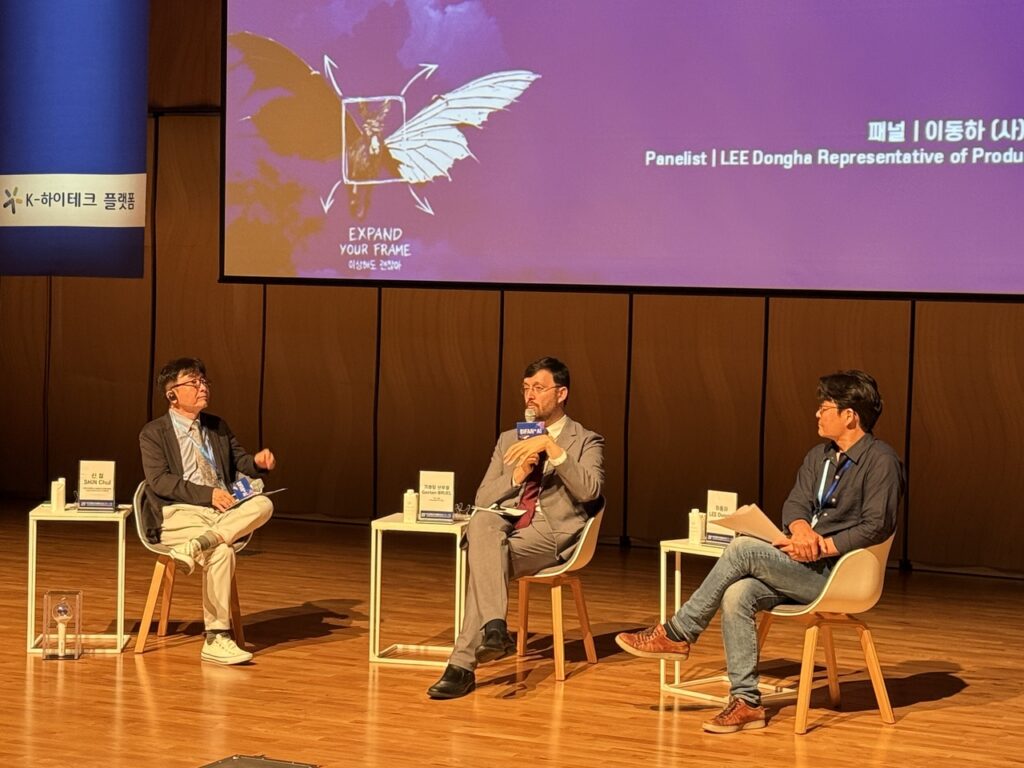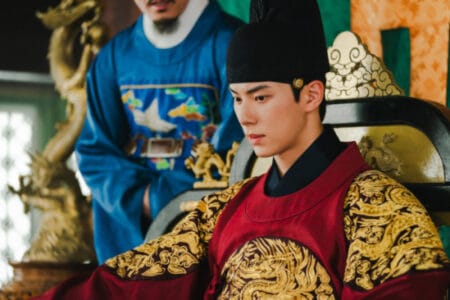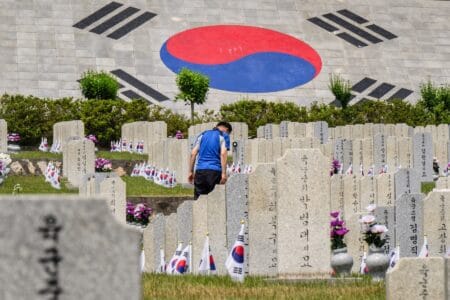July 8, 2025
BUCHEON – The 29th Bucheon International Fantastic Film Festival opened Thursday with a bold statement on cinema’s future, selecting as its opening film “About a Hero” — a hybrid documentary by Piotr Winiewicz featuring an AI-generated screenplay trained on Werner Herzog’s complete filmography.
The festival’s commitment to exploring artificial intelligence runs deep, with 11 AI films among its 217-title program and a three-day conference dedicated to examining how the technology is reshaping creative processes in cinema.
Sunday marked the first day of the festival’s AI conference at Bucheon Art Center, bringing together industry pioneers, technologists and policymakers to examine practical applications and future implications of AI-driven production. The sessions revealed both the technology’s rapid development and the film industry’s varied responses to its integration.
Sunday’s conference began with presentations from leading Korean producers working with AI technology. Roy Oh, who runs the YouTube channel Oddy Studio, premiered his short film “Color My Garden,” a biographical piece about Frida Kahlo told from the artist’s perspective.
The film, created using tools like Midjourney and Runway, showcased the creator’s signature style of blending classical art with contemporary settings. While the film at times exhibits the uncanny sleekness and occasional awkwardness of AI-generated content — repetitive compositions, abrupt cuts between scenes — moments of genuine visual innovation were palpable, particularly in sequences showing flowers blooming from Kahlo’s body.
“It’s not just what AI makes, it’s how we make AI tell your story,” Oh said, describing his week-long production process that treats AI collaboration like “writing a book in real time.”
Lee Sang-wook of MBC C&I Content Lab followed with a demonstration of AI’s integration into traditional television production, showing how his team enhanced space scenes in a TV show by combining AI-generated visuals with live actors. Viewers who watched the show responded positively to the hybrid approach.
“Starting from prompts, we can now visualize concepts that would have cost millions,” Lee said. His lab, launched in 2024, runs training workshops for aspiring creators and has produced several award-winning AI films, including “Mateo,” which won the grand prize at Korea’s first AI International Film Festival.
The afternoon panel discussion, originally intended to focus on AI, quickly pivoted to broader industry concerns about Korea’s declining theater attendance and competition from streaming platforms. Featuring festival director Shin Chul, French National Cinema Center President Gaetan Bruel and producer Lee Dong-ha, the conversation centered on Korea’s struggling film industry and potential lessons from France’s protective measures.
Bruel outlined the French government’s comprehensive support system, including mandatory “holdback” periods that reserve theatrical releases for four months before they are available for streaming. In Korea, films often appear on platforms within weeks of theatrical release.
“In France, we had 181 million tickets sold last year — only a 10 percent decrease from pre-pandemic levels,” Bruel noted, comparing it to Korea’s nearly 50 percent drop. He emphasized that, in France, people with the most streaming subscriptions are often the most avid moviegoers.
The French model mandates streaming platforms reinvest part of their revenue into local content — a system that generated €900 million for 180 projects by 140 independent production companies.
When asked about AI’s impact on cinema’s future, Bruel expressed measured skepticism.
“Cinema is about emotions, about the infinite complexity of dialogue,” he said. “While AI brings new possibilities, I have more reasons to be concerned than enthusiastic. The risk is reducing the extent of creativity.”
The day’s most practical analysis came from Sten-Kristian Saluveer, CEO of Storytek and Strategic Advisor for Cannes NEXT, who delivered a recorded lecture mapping AI’s integration across global film production. His presentation showcased how major festivals beyond BIFAN have adapted, with Rotterdam and Tribeca now accepting AI films in their official competitions.
Saluveer highlighted the evolution from “AI artists” to “AI studio directors” — creatives who combine traditional filmmaking knowledge with technical expertise. Major studios now use AI for pre-visualization, with one TV series generating 24 VFX shots in a single day versus weeks it would take using conventional methods.
“We’re seeing AI-enhanced workflows where the technology supports rather than replaces traditional filmmaking,” Saluveer explained. The applications extend beyond visual effects into budgeting, script development and regulatory compliance — what he termed a comprehensive “optimization paradigm.”
Genre filmmaking would particularly benefit from this trend, with tools like Veo helping independent horror directors create proof-of-concept materials previously requiring studio backing.
Looking ahead, Saluveer predicted the rise of AI-transparent filmmaking within a few years, in which the technology becomes as ubiquitous and routine as digital cameras.
“Instead of thinking narrowly about AI producing visual content, it’s becoming a huge optimizer,” he said, emphasizing that success requires investing in talent development over the acquisition of tools. “Great filmmakers powered with AI will make great AI films. Underskilled filmmakers will ultimately make bad films.”







